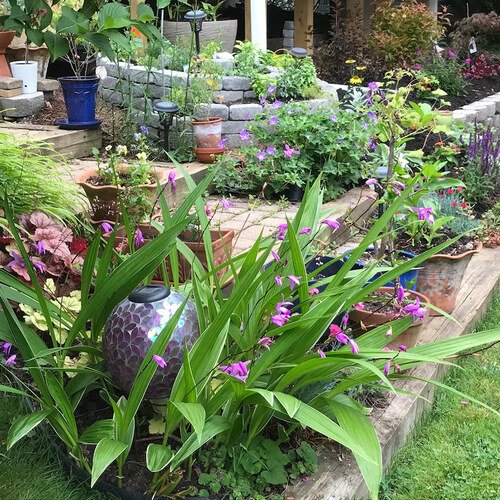
[ad_1]
In the world of web development, the
The
One of the key benefits of using the
In addition to organizing content, the
Another important use of the
When it comes to search engine optimization (SEO), the
In conclusion, the
The Little Zebra miscanthus is a compact grass variety that grows to a height of about 3 feet with a spread of 2 feet. It features narrow green leaves with distinctive creamy white stripes that resemble a zebra’s stripes, hence its name. This grass is known for its upright growth habit and graceful arching foliage, making it a perfect choice for adding texture and movement to garden beds and borders.
In addition to its attractive foliage, the Little Zebra miscanthus also produces feathery plumes of pinkish-red flowers in late summer to early fall. These flowers add a soft, ethereal quality to the plant and provide visual interest throughout the growing season. As the flowers fade, they give way to fluffy seed heads that persist well into the winter, adding structure and beauty to the winter garden.
The Coral Crème Drop phlox, on the other hand, is a stunning perennial plant with clusters of fragrant, trumpet-shaped flowers in shades of coral and cream. This phlox variety is known for its long bloom time, starting in midsummer and continuing through the fall. The flowers attract pollinators like bees and butterflies, adding a lively buzz to the garden.
When planted together, the Little Zebra miscanthus and Coral Crème Drop phlox create a harmonious color palette of green, white, and coral that is both soothing and eye-catching. The contrasting textures of the grass and the flowers add depth and dimension to the planting, creating a dynamic and visually appealing display.
To enhance the beauty of this vignette, consider adding other plants with complementary colors and textures. For example, you could plant low-growing ground covers or trailing vines around the base of the grass to fill in the space and create a lush carpet of foliage. Tall, spiky plants like irises or salvias can be planted behind the miscanthus to provide a dramatic backdrop and add vertical interest to the planting.
In terms of maintenance, both the Little Zebra miscanthus and the Coral Crème Drop phlox are relatively low-maintenance plants. They prefer full sun to partial shade and well-drained soil. The grass should be cut back to the ground in late winter or early spring to make way for new growth, while the phlox can be deadheaded regularly to encourage continuous blooming.
Overall, the combination of the Little Zebra miscanthus and Coral Crème Drop phlox is a winning one that is sure to bring beauty and charm to any garden. Whether planted in a formal garden bed, a mixed border, or a container, these two plants will add interest and elegance to the landscape year-round. So why not give them a try in your own garden and enjoy the beauty they bring? the benefits of practicing mindfulness in daily life
Mindfulness has become a popular topic in recent years, with more and more people turning to this practice as a way to improve their mental and emotional well-being. But what exactly is mindfulness, and why is it so beneficial?
Mindfulness is the practice of being fully present and aware in the current moment, without judgment or attachment to thoughts or emotions. It involves paying attention to your thoughts, feelings, bodily sensations, and the environment around you with a sense of openness and curiosity.
There are many ways to practice mindfulness, including meditation, yoga, breathing exercises, and simply being more mindful in your daily activities. By incorporating mindfulness into your daily life, you can experience a wide range of benefits that can have a profound impact on your overall well-being.
One of the key benefits of mindfulness is its ability to reduce stress and anxiety. When we are constantly caught up in our thoughts and worries, our bodies can go into a state of chronic stress, which can have negative effects on our physical and mental health. By practicing mindfulness, we can learn to let go of these racing thoughts and instead focus on the present moment, which can help to calm our minds and reduce feelings of stress and anxiety.
In addition to reducing stress, practicing mindfulness can also improve our overall mental health. Research has shown that mindfulness can help to reduce symptoms of depression, improve mood, and increase feelings of well-being. By bringing our attention to the present moment, we can learn to let go of rumination and negative thinking patterns that can contribute to feelings of sadness and hopelessness.
Mindfulness can also help us to cultivate a greater sense of self-awareness. By paying attention to our thoughts, emotions, and bodily sensations, we can become more in tune with ourselves and better understand our own needs and desires. This self-awareness can help us to make better decisions, improve our relationships, and live more authentically.
Another benefit of mindfulness is its ability to improve our focus and concentration. In today’s fast-paced world, it can be easy to become distracted and overwhelmed by the constant stream of information and stimuli around us. By practicing mindfulness, we can learn to bring our attention back to the present moment, which can help us to stay focused and engaged in our tasks.
Mindfulness can also help us to improve our relationships with others. When we are fully present and attentive in our interactions with others, we can communicate more effectively, listen more deeply, and respond with greater empathy and compassion. This can help to strengthen our relationships and create a more supportive and connected community.
In addition to these mental and emotional benefits, mindfulness can also have positive effects on our physical health. Research has shown that mindfulness can help to lower blood pressure, reduce inflammation, and improve immune function. By reducing stress and promoting relaxation, mindfulness can help to support our overall health and well-being.
There are many ways to incorporate mindfulness into your daily life. One simple way is to practice mindfulness meditation, in which you sit quietly and focus on your breath or a specific sensation in the body. You can also practice mindfulness while engaging in everyday activities, such as eating, walking, or driving, by bringing your attention to the present moment and noticing the sensations and experiences around you.
In conclusion, practicing mindfulness in daily life can have a wide range of benefits for our mental, emotional, and physical well-being. By cultivating greater awareness and presence in the present moment, we can reduce stress and anxiety, improve our mental health, enhance our relationships, and support our overall health. Whether through meditation, yoga, or simply being more mindful in our daily activities, incorporating mindfulness into our lives can help us to live with greater peace, clarity, and joy. The Benefits of Mindfulness Meditation
Mindfulness meditation has gained popularity in recent years as more and more people are seeking ways to reduce stress, improve mental health, and find inner peace. This ancient practice has been around for thousands of years and has been proven to have numerous benefits for both the mind and body. In this article, we will explore the benefits of mindfulness meditation and how it can positively impact your life.
1. Reduces Stress
One of the most well-known benefits of mindfulness meditation is its ability to reduce stress. In today’s fast-paced world, stress has become a common problem for many people. Mindfulness meditation helps to calm the mind and body, allowing you to let go of the worries and anxieties that may be weighing you down. By focusing on the present moment and letting go of negative thoughts, you can reduce stress and feel more at peace.
2. Improves Mental Health
In addition to reducing stress, mindfulness meditation has also been shown to improve mental health. Studies have found that regular meditation can help reduce symptoms of anxiety and depression, as well as improve overall mental well-being. By practicing mindfulness meditation, you can learn to better manage your emotions and thoughts, leading to a more positive outlook on life.
3. Enhances Focus and Concentration
Another benefit of mindfulness meditation is its ability to enhance focus and concentration. By training your mind to focus on the present moment, you can improve your ability to concentrate on tasks and be more productive. This can be especially helpful in today’s world where distractions are everywhere, making it difficult to stay focused on one thing at a time.
4. Increases Self-Awareness
Mindfulness meditation also helps to increase self-awareness, allowing you to better understand your thoughts, emotions, and behaviors. By becoming more self-aware, you can make better choices and respond to situations in a more mindful way. This can lead to improved relationships with others and a greater sense of self-acceptance and self-love.
5. Promotes Emotional Regulation
Emotional regulation is an important skill that can help you navigate the ups and downs of life with more ease. Mindfulness meditation teaches you to observe your emotions without judgment, allowing you to respond to them in a more balanced and healthy way. This can help you to better manage stress, anxiety, and other negative emotions, leading to a greater sense of emotional well-being.
6. Improves Physical Health
In addition to its mental health benefits, mindfulness meditation has also been shown to improve physical health. Studies have found that regular meditation can help lower blood pressure, reduce inflammation, and boost the immune system. By reducing stress and promoting relaxation, mindfulness meditation can have a positive impact on your overall health and well-being.
7. Enhances Sleep Quality
Many people struggle with sleep issues, whether it be difficulty falling asleep, staying asleep, or waking up feeling refreshed. Mindfulness meditation has been shown to improve sleep quality by calming the mind and promoting relaxation. By incorporating meditation into your bedtime routine, you can create a sense of calm and peace that can help you drift off to sleep more easily.
8. Cultivates Gratitude and Compassion
Mindfulness meditation also helps to cultivate gratitude and compassion, two important qualities that can lead to a more fulfilling and meaningful life. By focusing on the present moment and being more aware of your thoughts and emotions, you can develop a greater sense of gratitude for the small things in life. Additionally, mindfulness meditation can help you to cultivate compassion for yourself and others, leading to more positive and fulfilling relationships.
In conclusion, mindfulness meditation has numerous benefits for both the mind and body. From reducing stress and improving mental health to enhancing focus and concentration, this ancient practice can positively impact every aspect of your life. By incorporating mindfulness meditation into your daily routine, you can experience greater peace, happiness, and well-being. So why not give it a try and see for yourself the transformative power of mindfulness meditation.
[ad_2]





